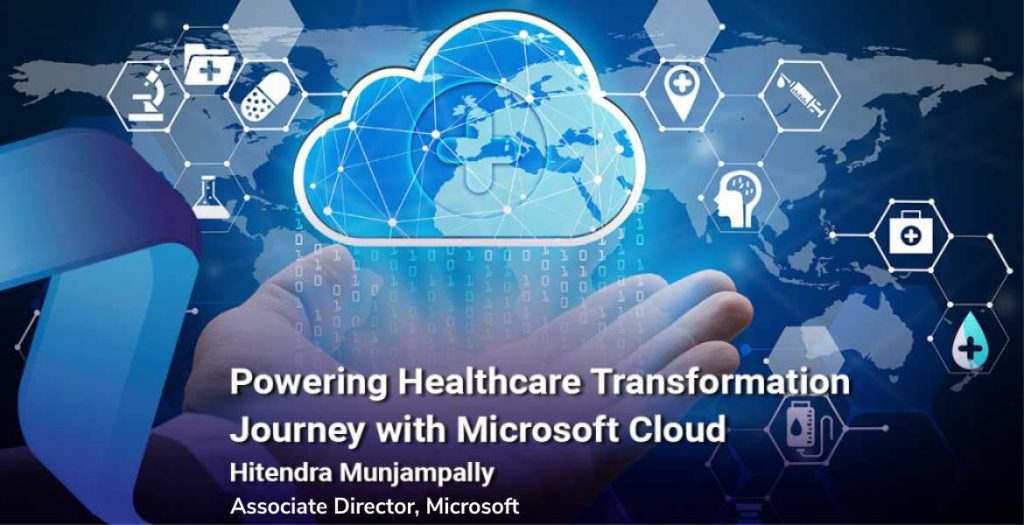As you know, the healthcare industry is going through a massive transformation. Today’s healthcare organizations are under pressure to do more with less. They’re facing increasing demands from patients, caregivers, and regulatory bodies – all while trying to contain costs. Furthermore, the rise of digital technologies and new patient expectations disrupt traditional business practices. Microsoft’s cloud platform is uniquely positioned to support healthcare organizations’ journey to value-based care. Azure, Office 365, and Dynamics 365 offer a complete, end-to-end solution for healthcare organizations of all sizes.
Azure provides the computing power needed to run mission-critical applications, Office 365 enables clinicians and staff to work together seamlessly, and Dynamics 365 gives health administrators the insights they need to make informed decisions. Together, these products can help healthcare organizations transform their care delivery models and improve patient outcomes. The Microsoft cloud is a powerful, all-encompassing platform that can help healthcare organizations meet the challenges of the 21st century. Microsoft’s cloud also seamlessly connects disparate systems and data sources, enabling a more holistic view of the patient. This is essential for population health management and precision medicine. In addition, Microsoft Cloud enables healthcare organizations to develop new services and business models to achieve their objectives.

What is Microsoft Cloud for Healthcare?
Microsoft Cloud for Healthcare1 is a comprehensive Azure-based platform enabling healthcare organizations to securely store, share, and analyze patient data. The platform offers a variety of features designed to meet the healthcare industry’s unique needs, including support for HIPAA compliance, real-time data analytics, and machine learning. With Microsoft Cloud for Healthcare, healthcare organizations can gain insights into population health trends, improve patient outcomes, and reduce costs. Additionally, the platform provides a foundation for developing new applications and services that can further transform care delivery. Microsoft Cloud for Healthcare is changing how healthcare is delivered by making patient data accessible and actionable. The platform has the potential to revolutionize healthcare and improve the lives of patients around the world.
Microsoft Cloud for Healthcare provides trusted, integrated capabilities that make it easier to improve the entire healthcare experience. Healthcare organizations can use Microsoft Cloud for Healthcare to securely store and share data while reducing costs and improving efficiency. In addition, Microsoft Cloud for Healthcare provides the tools necessary to build AI-powered health applications. These applications can help healthcare organizations to identify trends and improve patient outcomes. As healthcare systems continue to evolve, Microsoft Cloud for Healthcare will become essential to providing quality care.

Microsoft Cloud offers several key capabilities that can boost productivity for clinicians, empower healthcare team collaboration, enhance patient engagement, improve health data insights, and protect health information.
– Hitendra Munjampally Associate Director, Microsoft MOURI Tech
Key Capabilities: Transforming the Healthcare Journey
Microsoft Cloud for Healthcare provides the tools and capabilities that healthcare organizations need to improve patient care. It offers several key capabilities that can boost productivity for clinicians, empower healthcare team collaboration, enhance patient engagement, improve health data insights, and protect health information. The platform enables clinicians to be more productive, collaborating with their teams and delivering secure, personalized experiences to engage patients. It also helps to get insights from data to identify clinical trends and improve care. In addition, Microsoft Cloud for Healthcare helps alleviate provider burnout by automatically documenting patient encounters. By enabling faster documentation with accurate and responsive dictation and virtual assistant capabilities, clinicians can spend more time caring for patients and less on paperwork. Connecting and managing your team with tools that help them provide the best possible care can help to improve patient outcomes. And by using predictive analytics to identify clinical trends, you can improve the quality of care for all patients. The platform provides the data privacy and security healthcare organizations need to protect sensitive information. By leveraging the key capabilities of Microsoft Cloud for Healthcare, organizations can improve the quality of care they provide to patients.
Following are a few enhanced features that are available on the platform.
- Enhance patient engagement: In its latest release, the Microsoft Cloud for Healthcare platform provides a more enriched 360-degree patient view at the center of many healthcare processes. The Patient snapshot feature enables organizations to customize their end-to-end scenarios leveraging low-code and no-code tools like Microsoft Power Apps to optimize the patient view summary. The Patient trends feature an extension of the Unified patient view that shares patient indicators based on computed measures and insights about patient activities. These new features help organizations to support faster and better care management.
- Empower health team collaboration: Microsoft Cloud for Healthcare’s goal is to make the lives of frontline workers and customers easier. The Microsoft Teams EHR connector lets patients and providers launch virtual visits from within the Epic EHR system2 patient or provider portals. The EHR connection also includes Cerner EHR for multi-participant virtual visits (in private preview). Patients can launch virtual visits from the patient portal or SMS, requiring no app download. Healthcare providers can launch visits from Cerner PowerChart™.3 This makes it easier for healthcare providers to conduct virtual visits without downloading a separate app. It also has a new waiting room, queueing, and SMS features4for virtual visits.
- Data management: The Healthcare Data Model is now generally available and is designed to support healthcare organizations with the ability to better model health5 and operational data in Microsoft Dataverse6. The Healthcare Data Model eases interoperability and helps unify data to enable organizations to define and customize business processes and workflows to manage clinical communications, appointments, patient encounters, and care plans for care team coordination. The Healthcare Data Model’s current release contains several enhancements and improvements.

Conclusion
Microsoft announced the general availability of Microsoft Cloud for Healthcare about a year ago. Since then, they have continued to invest in building several capabilities so that customers and partners can extend and customize to meet their needs and business processes. In its latest Wave 27 release announcement, those investments make creating personalized patient experiences easier, giving healthcare teams collaboration tools and adopting data standards relevant to healthcare. Now health systems can use AI that combines multiple sources to provide complete visibility into data, relieve the administrative burden, and improve process and workflow automation to create actionable insights that deliver better and faster care at a lower cost. With these new capabilities, Microsoft is helping healthcare organizations transform how they provide care and improve the health of their communities.
At MOURI Tech, we have developed deep capabilities to power-up healthcare transformation journeys for our clients – from improving patient engagement to streamlining clinical workflows, leveraging Microsoft Cloud. We have helped both enterprise and SMB clients in their digital transformation journeys in several ways viz., process automation, collaboration and productivity solutions, etc. If you want to know where Microsoft Cloud can take you next, please reach out to us at inquiry@mouritech.com.
Hyperlinks
- https://www.microsoft.com/en-us/industry/health/microsoft-cloud-for-healthcare
- https://learn.microsoft.com/en-us/microsoft-365/frontline/ehr-admin-epic?view=o365-worldwide
- https://www.cerner.com/solutions/powerchart-touch
- YouTube
- https://learn.microsoft.com/en-us/dynamics365-release-plan/2021wave2/industry-clouds/healthcare/improved-ingestion-healthcare-data-into-dataverse
- https://learn.microsoft.com/en-us/power-apps/maker/data-platform/data-platform-intro
- https://cloudblogs.microsoft.com/industry-blog/health/2022/11/01/inspiring-digital-perseverance-at-hlth-2022/
Author Bio:
Hitendra Munjampally
Associate Director, Microsoft
Hitendra has a strong track record of leading and enabling teams to deliver cutting-edge IT solutions to enterprise customers across Hi-Tech, Manufacturing & Health, Energy & Utilities, Travel & Logistics and Services industry domains. He has extensive experience in developing IT strategy, next-gen service offerings, pre-sales, technology solutions & accelerators to help customers digitalize and modernize their workloads, leveraging Microsoft capabilities.






